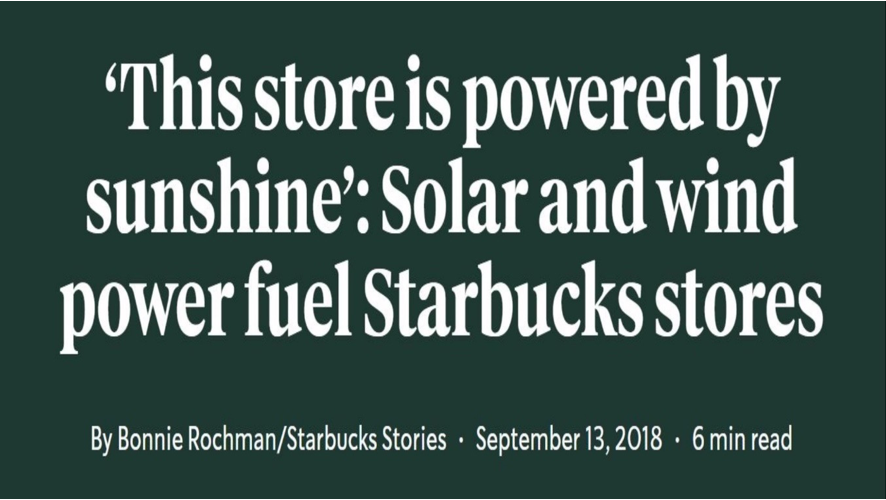Exposing corporate energy deception: Starbucks
Starbucks' dangerous deceptions about being "net zero" and "100% renewable"
Starbucks, an advocate of disastrous “net zero” and "100% renewable" policies, positions itself as proof that these policies can work. In fact, Starbucks’ stores, supply chain, and rapid expansion in China are mostly powered by fossil fuels.
Tweet this | Email this
Starbucks is a major supporter of “net zero” and “100% renewable” policies. They are a founding member of the “Transform to Net Zero Initiative,” which pushes businesses and government to rapidly eliminate the fossil fuels that today provide 80% of the world’s energy.1
Tweet this | Email thisTo help justify its support of “net zero” and “100% renewable,” Starbucks portrays itself as well on its way toward these goals, with stores that are already powered by solar and wind energy.2
Tweet this | Email thisStarbucks' portrayal of itself as pursuing and achieving “net zero” is deceiving in 3 ways.
1. Its stores are mostly fossil-fueled.
2. Its supply chain is mostly fossil-fueled.
3. Its rapid expansion in China is mostly fossil-fueled.
Tweet this | Email thisWhile Starbucks portrays its stores as powered by solar and wind, in fact most of its stores are largely powered by fossil fuels. For example Starbucks’ North Carolina stores are powered by this mix of electricity—largely fossil fuel, with little solar and wind.3
Tweet this | Email thisHow does Starbucks claim to have stores “powered by sunshine” when this is not true? Through the deception of “renewable electricity credits,” where Starbucks pays utilities to give them credit for others’ solar and wind use and give others the blame for their fossil fuel use.4
Tweet this | Email thisStarbucks justifies taking credit for others’ solar/wind use by paying for solar and wind projects throughout the US. But 1) they use very little of the electricity they add, and 2) adding intermittent solar/wind electricity creates new costs and reliability problems for others.
Tweet this | Email thisStarbucks' and other companies’ desire to look good by paying for new solar panels and wind turbines contributed to the Texas blackouts. The Texas grid would have been in much better shape had it not shut down numerous reliable power plants in favor of unreliable solar and wind.5
Tweet this | Email thisWhile Starbucks PR focuses on how its stores are powered, most of the energy that goes into Starbucks coffee involves other parts of its supply chain that are mostly fossil-fueled. The company fails to quantify this in its impact report.6 Tweet this | Email this
In 2020, Starbucks surpassed 4,400 stores across China. Starbucks is committed to opening “a new Starbucks location every 15 hours until the end of 2022.” China's electricity is over 60% coal. Clearly, Starbucks is prioritizing growth over reducing CO2 emissions.7
Tweet this | Email thisThe reality of Starbucks’ energy usage is that Starbucks is dominantly using fossil fuels and will be dominantly using them for the foreseeable future. The reason is that in practice they rightly believe that the benefits of using fossil fuels outweigh the negative side-effects.
Tweet this | Email thisStarbucks' fossil-fueled behavior is much more rational than its climate catastrophe rhetoric. Fossil fuels have actually made us far safer from climate by fueling the amazing machines that protect us against storms, protect us against extreme temperatures, and alleviate drought.8
Tweet this | Email thisInstead of leveling with the public about their current and likely future energy use being fossil fueled, Starbucks is promoting baseless, dangerous claims that they and the world can go “net zero” or even “100% renewable” soon. This is incredibly irresponsible.
Tweet this | Email thisOne other negative consequence of Starbucks’ “100% renewable” advocacy is that it discriminates against nuclear energy—a form of non-carbon energy that has far more promising long-term potential than “renewable” solar and wind
Tweet this | Email thisThe biggest victims of Starbucks' anti-fossil fuel, anti-nuclear push for “net zero” are poor people—both the poor in the US who are most harmed by rising energy prices, and above all impoverished people around the world who need fossil fuels to develop.9
Tweet this | Email thisStarbucks’ energy deceptions and support of anti-fossil fuel, anti-nuclear policies are particularly shameful given that Starbucks' leaders, including its Board members, like all wealthy people, directly and indirectly use huge amounts of fossil fuel.
Tweet this | Email thisThe Chair of “100% renewable”-advocating Starbucks’ Board, Mellody Hobson, “travels constantly” (read: huge oil usage) according to Vanity Fair, and according to the San Jose Mercury News is a “real estate baller” (read: owns many homes powered by fossil fuels).10
Tweet this | Email thisTell Starbucks to stop deceiving the public about its energy usage, and above all to stop using its position to advocate deadly “net zero” and “100% renewable” policies that hurt the world’s poorest people most of all.11
Tweet this | Email this
For every million people on earth, annual deaths from climate-related causes (extreme temperature, drought, flood, storms, wildfires) declined 98%--from an average of 247 per year during the 1920s to 2.5 in per year during the 2010s.
Data on disaster deaths come from EM-DAT, CRED / UCLouvain, Brussels, Belgium – www.emdat.be (D. Guha-Sapir).
Population estimates for the 1920s from the Maddison Database 2010 come from the Groningen Growth and Development Centre, Faculty of Economics and Business at University of Groningen. For years not shown population is assumed to have grown at a steady rate.
Population estimates for the 2010s come from World Bank Data.








